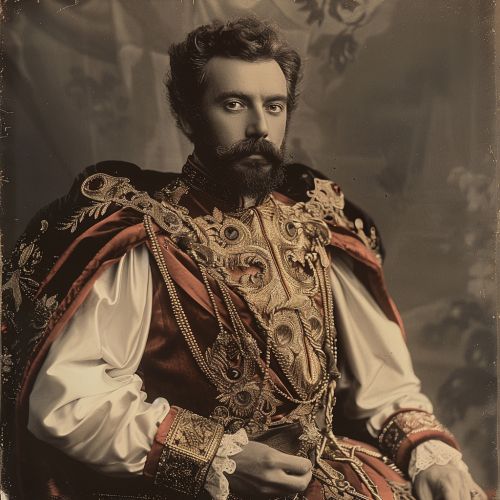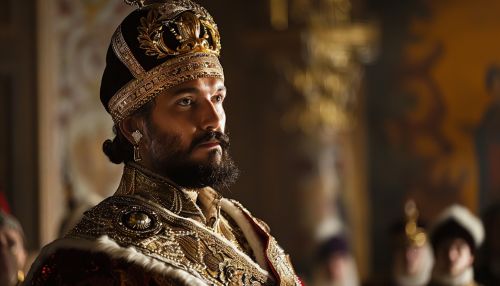Boris Christoff: Difference between revisions
(Created page with "== Early Life and Education == Boris Christoff, born on May 18, 1914, in Plovdiv, Bulgaria, was one of the most renowned operatic bass singers of the 20th century. His early exposure to music came through his family, particularly his father, who was an amateur singer. Christoff's formal education began at the French College in Plovdiv, where he demonstrated a keen interest in music and languages. In 1933, Christoff moved to Sofia to study law at the University...") |
No edit summary |
||
| Line 13: | Line 13: | ||
Christoff's breakthrough came in 1949 when he performed the title role in [[Modest Mussorgsky|Mussorgsky]]'s [[Boris Godunov (opera)|Boris Godunov]] at the [[Royal Opera House]] in London. His portrayal of the troubled Tsar was lauded for its emotional depth and vocal power, solidifying his reputation as one of the leading basses of his time. This role would become one of his signature performances, earning him international acclaim. | Christoff's breakthrough came in 1949 when he performed the title role in [[Modest Mussorgsky|Mussorgsky]]'s [[Boris Godunov (opera)|Boris Godunov]] at the [[Royal Opera House]] in London. His portrayal of the troubled Tsar was lauded for its emotional depth and vocal power, solidifying his reputation as one of the leading basses of his time. This role would become one of his signature performances, earning him international acclaim. | ||
[[Image:Detail-92345.jpg|thumb|center|Portrait of Boris Christoff in costume as Boris Godunov.|class=only_on_mobile]] | |||
[[Image:Detail-92346.jpg|thumb|center|Portrait of Boris Christoff in costume as Boris Godunov.|class=only_on_desktop]] | |||
== Repertoire and Vocal Technique == | == Repertoire and Vocal Technique == | ||
Latest revision as of 23:55, 14 June 2024
Early Life and Education
Boris Christoff, born on May 18, 1914, in Plovdiv, Bulgaria, was one of the most renowned operatic bass singers of the 20th century. His early exposure to music came through his family, particularly his father, who was an amateur singer. Christoff's formal education began at the French College in Plovdiv, where he demonstrated a keen interest in music and languages.
In 1933, Christoff moved to Sofia to study law at the University of Sofia. During his time at the university, he joined the Gusla Choir, where his exceptional vocal talent was noticed by the choir's conductor, Georgi Dimitrov. Dimitrov encouraged Christoff to pursue a career in singing, leading him to receive private lessons from renowned Bulgarian baritone Christo Brambarov.
Career Beginnings
Christoff's professional career began in 1942 when he won a singing competition in Vienna. This victory led to further studies in Italy under the tutelage of baritone Riccardo Stracciari. His Italian debut came in 1946 at the Teatro alla Scala in Milan, where he performed the role of Colline in Puccini's La Bohème. His performance was met with critical acclaim, establishing him as a rising star in the operatic world.
Rise to Prominence
Christoff's breakthrough came in 1949 when he performed the title role in Mussorgsky's Boris Godunov at the Royal Opera House in London. His portrayal of the troubled Tsar was lauded for its emotional depth and vocal power, solidifying his reputation as one of the leading basses of his time. This role would become one of his signature performances, earning him international acclaim.


Repertoire and Vocal Technique
Christoff's repertoire was extensive, encompassing roles in operas by Verdi, Mozart, and Wagner, among others. Some of his most notable roles included Philip II in Verdi's Don Carlo, Mephistopheles in Gounod's Faust, and King Mark in Wagner's Tristan und Isolde.
His vocal technique was characterized by a rich, resonant timbre and exceptional control over dynamics and phrasing. Christoff's ability to convey complex emotions through his voice made him a favorite among both audiences and critics. His interpretations were marked by a profound understanding of the characters he portrayed, often bringing a unique psychological depth to his performances.
Recordings and Legacy
Christoff's recordings remain some of the most celebrated in the operatic canon. His complete recordings of Boris Godunov, Don Carlo, and Faust are considered definitive interpretations of these works. In addition to his operatic recordings, Christoff also recorded a significant body of Russian art songs, showcasing his versatility and deep connection to the Russian repertoire.
Christoff's influence extended beyond his performances. He was known for his dedication to preserving and promoting Bulgarian musical heritage, often including Bulgarian folk songs in his recitals. His contributions to the world of opera were recognized with numerous awards and honors, including the title of People's Artist of Bulgaria.
Personal Life and Later Years
Despite his international fame, Christoff remained deeply connected to his Bulgarian roots. He was a passionate advocate for Bulgarian culture and often returned to his homeland to perform and teach. In his later years, Christoff focused on mentoring young singers, passing on his extensive knowledge and experience to the next generation of operatic talent.
Christoff passed away on June 28, 1993, in Rome, Italy. His legacy continues to be celebrated by opera enthusiasts and musicians worldwide. His recordings and performances remain a testament to his extraordinary talent and enduring impact on the world of opera.
